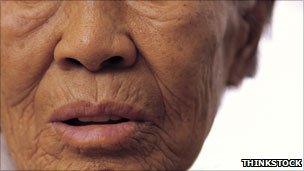Red tape 'hinders elderly care in Wales' report finds
- Published

The elderly need more respect and less red tape in their care, say carer organisations
Red tape and overly cautious officials are problems facing people who care for the elderly, a report has found.
Care organisations say "common sense and trust" need to be brought back into Wales' care system for elderly people.
Angela Roberts, of Wales Carers Alliance, said carers have complained of having to deal with up to 15 agencies at the same time.
The report has been produced by an alliance, including the Older People's Commissioner for Wales.
It called for a more joined-up approach between organisations responsible for caring for older people and a move away from a "risk-averse culture that hinders care".
It found that an overly-cautious approach also undermined the aim of helping elderly people to be, and feel, independent.
Ms Roberts, who attended the symposium that led to the report, said there was a growing recognition that the estimated 350,000 carers in Wales were under-represented.
She said: "It's a stress in the day-to-day life of family carers when there isn't a single point of access.
"It's the bureaucracy across the local authorities and the the health service. Very often carers just give up and battle on on their own.
Linda Chandler, programme manager with Gwent Frailty Programme, a Torfaen-based project to co-ordinate an integrated model of community-based care at local authorities, said an example of a risk-averse approach to care was what happened when someone became too frail to go shopping on their own.
"What they would rather have is help to go shopping, rather than have someone to do the shopping for them.
"That is all about being part of the community and avoiding social isolation."
Victoria Lloyd, director of influencing and programme development at Age Cymru, said: "Making decisions about our lives and potentially taking risks are something we learn to take for granted.
"It's important that we don't seek to take away all the risks that older people may face, thereby removing their choice and control. Rather, we need to ensure that support is available to help older people manage those risks they do face and continue to lead full and active lives and maintain their own identity."
November's symposium was jointly organised by the Church in Wales.
Archbishop Dr Barry Morgan said: "This is much more than the challenge of cuts.
"Too many older people find it difficult to speak out for themselves when things go wrong with their care and their views aren't always taken seriously."
Ruth Marks, Older People's Commissioner for Wales, said: "Organisations, agencies, people in local communities must work together to improve understanding of older people in their area.
"We all need to recognise the huge contribution made by older people across Wales, whilst also ensuring that a co-ordinated pattern of help and support is available when needed."